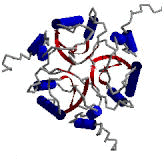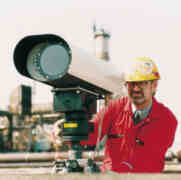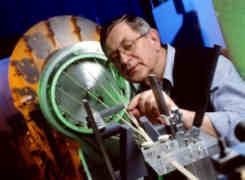
Two new techniques will assist the rapid cataloguing of proteins’ roles in the cell.
Decoding the human genome sequence was merely a preliminary step towards understanding how living cells work. Two new techniques should assist the next step: working out the functions of all the proteins that the genes encode 1,2 .
Selectively sticking to small molecules is central to most proteins’ function. Proteins generally have delicately sculpted binding sites, clefts i

Embargo until September, 6 2001
E-BioSci is a new, next generation scientific information service initiated by EMBO to meet the future needs of researchers in the life sciences and funded by the European Commission with 2,4 million Euro over three years. The service – aimed at establishing Europe’s leadership in one of the most important and fast moving scientific fields of our day – will offer scientists and other researchers new forms of navigation through the dramatically increasing floo

Delta Debugging automates the scientific method of debugging. The basic idea of the scientific method is to establish a hypothesis on why something does not work. You test this hypothesis, and you refine or reject it depending on the test outcome. When debugging, people are doing this all the time. Manually. Delta Debugging automates this process. Read more…

The Problem Considerable progress has been made in basic research and software development for modeling traffic flow. However, user-friendly and affordable services which could prevent a car driver from getting stuck in a traffic jam are not yet as effective as they could be.
Dynamic guidance covering the major highways has already been implemented in many European countries. On secondary roads, and especially across major

Air pollution used to be something you could see and smell. But as air quality standards have tightened, the air over most industrial sites, airports and cities has gradually cleared. Nevertheless, invisible toxic agents such as ethyl benzene, butadiene and styrene continue to pose risks to public health. With a view to detecting and quantifying these agents, Siemens Environmental Systems Limited in Poole, England has introduced UV Falcon. The system consists of a transmitter that projects a UV (ult

Future generations of electric trains may use considerably less power than they do today thanks to the development of the first high temperature superconducting (HTS) cable. To produce the cable, Scientists at Siemens Corporate Technology in Erlangen, Germany started out with micron-sized particles of a brittle ceramic material. The particles were then embedded in a silver alloy. Through repeated rolling stages and annealing, the material was turned into ribbon-shaped wires. To make a cable from suc

Operations teams have confirmed NASA’s mission to “touch” the Sun survived its record-breaking closest approach to the solar surface on Dec. 24, 2024. Breaking its previous record by flying just…

At the Berlin synchrotron radiation source BESSY II, the largest magnetic anisotropy of a single molecule ever measured experimentally has been determined. The larger this anisotropy is, the better a…

LSU quantum researchers uncover hidden quantum behaviors within classical light, which could make quantum technologies robust. Understanding the boundary between classical and quantum physics has long been a central question…

Exploiting an ingenious combination of photochemical (i.e., light-induced) reactions and self-assembly processes, a team led by Prof. Alberto Credi of the University of Bologna has succeeded in inserting a filiform…

A team led by plant biotechnologist Prof Markus Schwarzländer from the University of Münster and biochemist Prof Bruce Morgan from Saarland University has developed new biosensors with which the ratio…

How deubiquitinases USP53 and USP54 cleave long polyubiquitin chains and how the former is linked to liver disease in children. Deubiquitinases (DUBs) are enzymes used by cells to trim protein…

Long gone are the days where all our data could fit on a two-megabyte floppy disk. In today’s information-based society, the increasing volume of information being handled demands that we…

In the search for new materials that can enable more efficient electronics, scientists are exploring so-called 2-D materials. These are sheets of just one atom thick, that may have all…

How simulations help manufacturing of modern displays. Modern materials must be recyclable and sustainable. Consumer electronics is no exception, with organic light-emitting diodes (OLEDs) taking over modern televisions and portable…

AQSolotl’s quantum controller is designed to be adaptable, scalable and cost-efficient. Quantum technology jointly developed at Nanyang Technological University, Singapore (NTU Singapore) and National University of Singapore (NUS) has now…

Pacific Northwest National Laboratory to contribute leadership to national effort in microelectronics design and development. Microelectronics run the modern world. Staying ahead of the development curve requires an investment that…

With a processing speed a billion times faster than nature, chip-based laser neuron could help advance AI tasks such as pattern recognition and sequence prediction. Researchers have developed a laser-based…